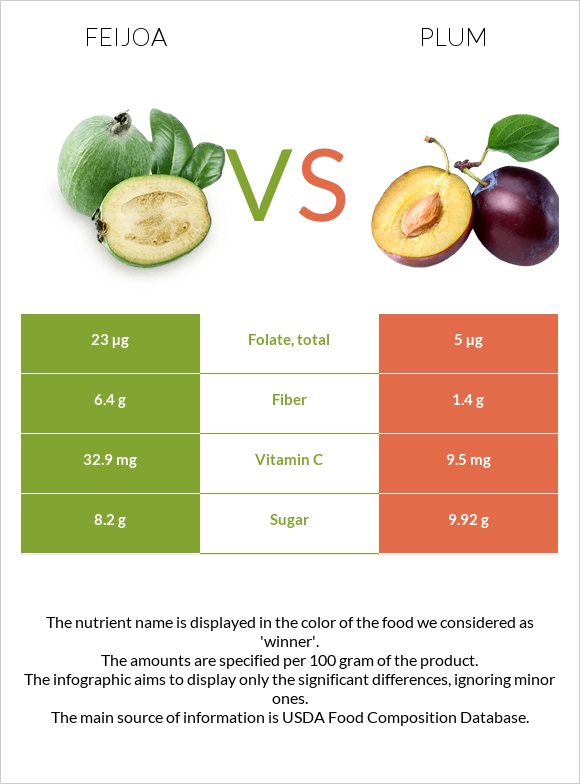Feijoa vs. Plum — In-Depth Nutrition Comparison
Compare
Summary of differences between feijoa and plums
- Feijoa has more vitamin C and fiber; however, plums are higher in vitamin A.
- Feijoa covers your daily need for vitamin C, 26% more than plums.
- Feijoa has 5 times more folate than plums. While feijoa has 23µg of folate, plums have only 5µg.
- Feijoa has less sugar.
- The glycemic index of plums is higher.
These are the specific foods used in this comparison Feijoa, raw and Plums, raw.
Infographic

Infographic link
Mineral Comparison
Mineral comparison score is based on the number of minerals by which one or the other food is richer. The "coverage" charts below show how much of the daily needs can be covered by 300 grams of the food.
| Contains more MagnesiumMagnesium | +28.6% |
| Contains more CalciumCalcium | +183.3% |
| Contains more PhosphorusPhosphorus | +18.8% |
| Contains more ManganeseManganese | +61.5% |
| Contains more IronIron | +21.4% |
| Contains more CopperCopper | +58.3% |
| Contains more ZincZinc | +66.7% |
| Contains less SodiumSodium | -100% |
Vitamin Comparison
Vitamin comparison score is based on the number of vitamins by which one or the other food is richer. The "coverage" charts below show how much of the daily needs can be covered by 300 grams of the food.
| Contains more Vitamin CVitamin C | +246.3% |
| Contains more Vitamin B5Vitamin B5 | +72.6% |
| Contains more Vitamin B6Vitamin B6 | +131% |
| Contains more FolateFolate | +360% |
| Contains more Vitamin AVitamin A | +∞% |
| Contains more Vitamin EVitamin E | +62.5% |
| Contains more Vitamin B1Vitamin B1 | +366.7% |
| Contains more Vitamin B2Vitamin B2 | +44.4% |
| Contains more Vitamin B3Vitamin B3 | +41.4% |
| Contains more Vitamin KVitamin K | +82.9% |
All nutrients comparison - raw data values
| Nutrient |  |
 |
DV% diff. |
| Vitamin C | 32.9mg | 9.5mg | 26% |
| Fiber | 6.4g | 1.4g | 20% |
| Folate | 23µg | 5µg | 5% |
| Vitamin B6 | 0.067mg | 0.029mg | 3% |
| Copper | 0.036mg | 0.057mg | 2% |
| Vitamin A | 0µg | 17µg | 2% |
| Vitamin B1 | 0.006mg | 0.028mg | 2% |
| Vitamin B5 | 0.233mg | 0.135mg | 2% |
| Vitamin K | 3.5µg | 6.4µg | 2% |
| Calories | 61kcal | 46kcal | 1% |
| Carbs | 15.21g | 11.42g | 1% |
| Calcium | 17mg | 6mg | 1% |
| Vitamin E | 0.16mg | 0.26mg | 1% |
| Manganese | 0.084mg | 0.052mg | 1% |
| Vitamin B2 | 0.018mg | 0.026mg | 1% |
| Vitamin B3 | 0.295mg | 0.417mg | 1% |
| Polyunsaturated fat | 0.136g | 0.044g | 1% |
| Protein | 0.71g | 0.7g | 0% |
| Fats | 0.42g | 0.28g | 0% |
| Net carbs | 8.81g | 10.02g | N/A |
| Magnesium | 9mg | 7mg | 0% |
| Potassium | 172mg | 157mg | 0% |
| Iron | 0.14mg | 0.17mg | 0% |
| Sugar | 8.2g | 9.92g | N/A |
| Zinc | 0.06mg | 0.1mg | 0% |
| Phosphorus | 19mg | 16mg | 0% |
| Sodium | 3mg | 0mg | 0% |
| Choline | 1.9mg | 0% | |
| Saturated fat | 0.104g | 0.017g | 0% |
| Monounsaturated fat | 0.056g | 0.134g | 0% |
| Tryptophan | 0.007mg | 0.009mg | 0% |
| Threonine | 0.019mg | 0.01mg | 0% |
| Isoleucine | 0.019mg | 0.014mg | 0% |
| Leucine | 0.028mg | 0.015mg | 0% |
| Lysine | 0.038mg | 0.016mg | 0% |
| Methionine | 0.007mg | 0.008mg | 0% |
| Phenylalanine | 0.019mg | 0.014mg | 0% |
| Valine | 0.019mg | 0.016mg | 0% |
| Histidine | 0.009mg | 0.009mg | 0% |
| Fructose | 2.95g | 3.07g | 0% |
| Omega-3 - ALA | 0.029g | N/A | |
| Omega-6 - Linoleic acid | 0.107g | N/A |
Macronutrient Comparison
Macronutrient breakdown side-by-side comparison
| Contains more FatsFats | +50% |
| Contains more CarbsCarbs | +33.2% |
~equal in
Protein
~0.7g
~equal in
Water
~87.23g
~equal in
Other
~0.37g
Fat Type Comparison
Fat type breakdown side-by-side comparison
| Contains more Poly. FatPolyunsaturated fat | +209.1% |
| Contains less Sat. FatSaturated fat | -83.7% |
| Contains more Mono. FatMonounsaturated fat | +139.3% |
Carbohydrate type comparison
Carbohydrate type breakdown side-by-side comparison
| Contains more SucroseSucrose | +86.6% |
| Contains more GlucoseGlucose | +118.5% |
| Contains more MaltoseMaltose | +∞% |
| Contains more GalactoseGalactose | +∞% |
~equal in
Starch
~0g
~equal in
Fructose
~3.07g
~equal in
Lactose
~0g





